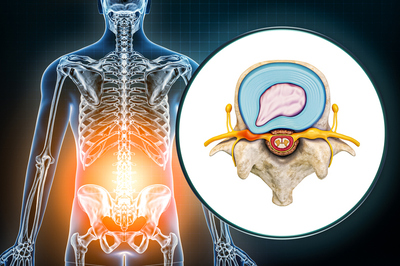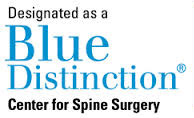What Should You Do If You Think You Have a Herniated Disc?
 Chances are, If you’ve slipped a disc, you’ll know it immediately because it’s often (though not always) quite painful.
Chances are, If you’ve slipped a disc, you’ll know it immediately because it’s often (though not always) quite painful.
A herniated disc, also known as a slipped or ruptured disc, occurs when the gel-like center of a spinal disc bulges out through a tear in the outer ring of the disc. This can put pressure on the spinal cord or nerves, leading to pain, numbness, or weakness in the affected area.
Symptoms
Symptoms can include sharp or shooting pain in the affected area, as well as numbness, tingling, and weakness in the affected limbs. However, it is important to note that the level of pain can vary depending on the individual, the location and size of the herniation, and any underlying medical conditions.
If you think you may have a herniated disc, it’s important to seek medical attention as soon as possible to determine the best course of treatment.
Treatment
The first step in treating a herniated disc is to manage the pain and inflammation. Over-the-counter pain relievers such as ibuprofen or acetaminophen can be helpful, as well as the application of heat or cold to the affected area.
Physical therapy can also be beneficial in reducing pain and inflammation.
If these conservative treatments are not effective, your doctor may recommend more aggressive treatments such as epidural injections or nerve blocks to reduce inflammation and pain. Surgery may also be necessary in some cases if the herniated disc is causing severe nerve compression or if other treatments have not been effective.
It’s also important to take steps to prevent a herniated disc from recurring or worsening. This may include exercises to strengthen the muscles in your back and improve your posture, as well as maintaining a healthy weight.
How to Help Prevent Future Problems
In the meantime, it’s essential to avoid activities that can aggravate the herniated disc, such as heavy lifting, bending, twisting, or prolonged sitting. It’s also recommended to sleep on a firm mattress and avoid sleeping on your stomach.
In Summary
If you suspect you have a herniated disc, it’s crucial to seek medical attention as soon as possible. Your doctor will work with you to develop a treatment plan that may include pain management, physical therapy, and, if necessary, more aggressive treatments such as injections or surgery.
It’s also important to take steps to prevent a herniated disc from recurring or worsening, such as exercise, maintaining a healthy weight, and avoiding activities that can aggravate the herniated disc.
